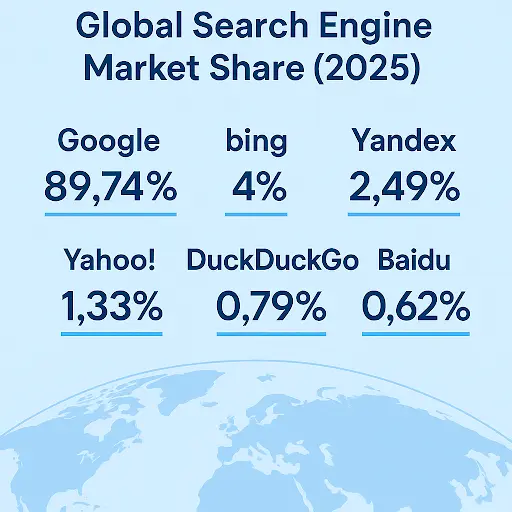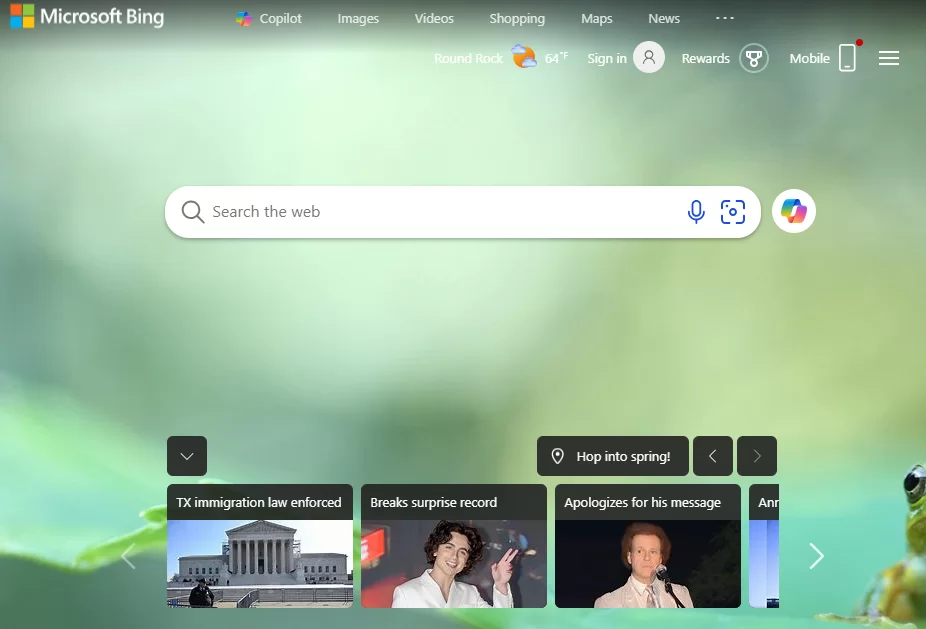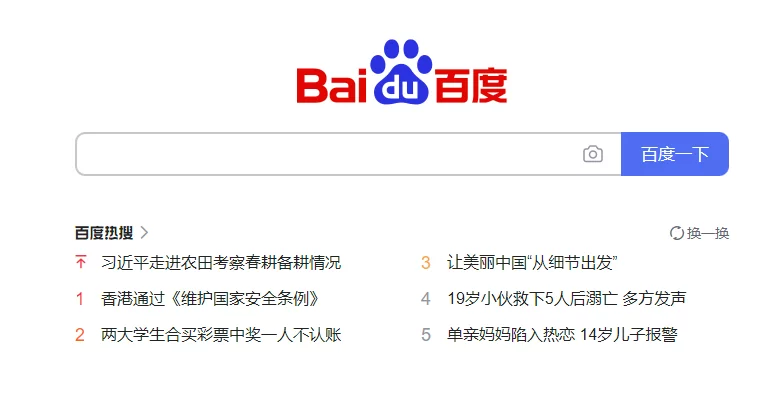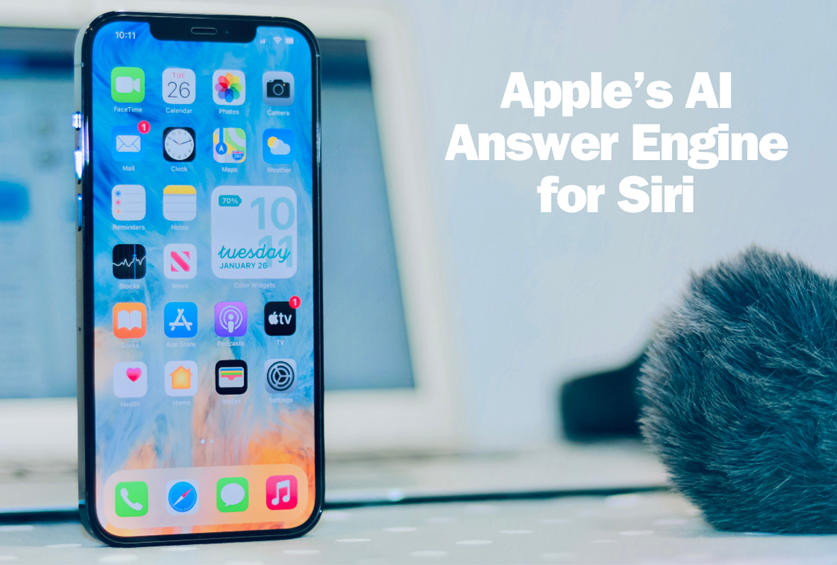The search engine landscape is evolving rapidly. Google is still the top player in the world and in the U.S. However, its market share is slowly going down. AI-powered options are growing. There are also privacy-focused platforms. Additionally, regional competitors like Yandex and Baidu are emerging. For digital marketers, understanding these shifts is crucial to stay ahead with a strong, adaptive SEO strategy.
This comprehensive guide covers:
- The present global and U.S. search engine market shares
- Key trends affecting user behavior in 2025
- Strategic implications for marketers and SEO specialists
- Actionable heads to build topical authority across several search engines
- FAQs, comparative charts, and internal linking strategies
Global Search Engine Market Share (March 2025)
According to Statcounter Global Stats, the current global market shares are:

- Google: 89.74%
- Bing: 4.00%
- Yandex: 2.49%
- Yahoo!: 1.33%
- DuckDuckGo: 0.79%
- Baidu: 0.62%
Google has tending below the 90% mark for the first time in over a decade, indicating increased competition and extension of user preferences.
U.S. Market Share Snapshot (March 2025)
- Google: 86.83%
- Bing: 7.56%
- Yahoo!: 2.80%
- DuckDuckGo: 2.23%
- Yandex: 0.30%
- Ecosia: 0.09%
The rise of Bing in the U.S. is remarkable, somewhat driven by its incorporation with Microsoft products and AI features powered by ChatGPT.
Beyond Google: Key Search Engines to Watch in 2025
While Google leads, it’s important not to overlook the other key players in the search engine space, each of which has an exclusive user base and SEO importance.
Microsoft Bing
What Is Microsoft Bing?

Microsoft Bing is a search engine developed and hosted by Microsoft. It was launched way back in 2009 as a replacement for earlier Microsoft search engines like Live Search, MSN Search, and Windows Live Search.
Bing offers an array of search services, which include:
- Web search
- Image and video search
- Map and local search
- Focused subsections like Bing News, Bing Finance, and Bing Sports
How Bing Works
Bing’s search functionality scours advanced search technology for relevant results. Bing leverages technologies such as:
- Semantic search
- NLP – Natural language processing
- Machine learning – ML
Bing also powers search capabilities in other Microsoft products and services, including:
- Microsoft Edge (web browser)
- Cortana (Microsoft’s virtual assistant)
Bing vs. Google: What’s the Difference?
Bing and Google share the same goal of giving users useful search information, but differ on how they rank and display content.
Bing is more concerned with on-page SEO factors, such as:
Keyword usage in content
- Page Meta titles
- Metadata
- Domain authority (DA)
Google, on the other hand, is more concerned with comprehending a search intent better. It breaks the code in the language of the query based on context because it has strong AI models like BERT and MUM
Yahoo!
It’s hard to talk about the early days of the internet without mentioning Yahoo! For many of us, Yahoo! was the first place we checked email, read the news, or even searched the web. It was more than just a website—it was how we experienced the internet.
Yahoo!’s Journey: From Internet Icon to Modern Media Brand
Yahoo! started back in 1994, when the internet was still a mystery to most people. Originally built as a web directory by two Stanford students, it helped users find websites in a time before Google existed. If you remember clicking through category after category just to find a site—that was Yahoo!’s bread and butter.
As the web evolved, so did Yahoo!. It quickly grew into a major internet hub, offering:
- Yahoo! Search – your go-to before “Googling” was a thing
- Yahoo! Mail – one of the first free email services
- Yahoo! News, Finance, and Sports – trusted sources for breaking headlines
- Entertainment and lifestyle content that kept users engaged for hours
By the late ’90s and early 2000s, Yahoo! had become a household name, visited by millions daily.
Decline and Change in Ownership
But like many early tech giants, Yahoo! struggled to keep up with the accelerating online world. Google’s smarter search engine, Facebook’s social site, and other more agile platforms stepped by step displaced Yahoo!
In 2016, after years of ups and downs, Yahoo! sold its core web business to Verizon, including its search engine and news portal. The company was folded into a larger media group called Oath Inc., and then later sold again in 2019 to Apollo Global Management, a private investment firm. Even with all these transformations, the Yahoo! name never went away. In fact, it was eventually restored under the classic Yahoo! brand—a nod to its legendary past.
Yahoo! Today: What Does It Still Offer? 📲
While Yahoo! no longer reigns supreme on the internet, it still holds up for millions of users every day. More focused on digital media and web services these days, here’s what Yahoo! now has:
✅ Yahoo! Mail
Even one of the world’s top free email service providers, Yahoo! Mail delivers a simple look, ample space, and intelligent organization tools.
📈 Yahoo! Finance
Whether checking stock prices, market trends, or personal finances advice, Yahoo! Finance continues to be one of the primary sources. Professionals and casual investors alike use it extensively.
📰 Yahoo! News
Covering the latest stories from politics to pop culture, Yahoo! News curates content from trusted partners as well as its own in-house editors.
🏈 Yahoo! Sports
Whether you’re an NFL, NBA, college football, or fantasy sports fan, Yahoo! Sports has scores, news, and in-depth coverage.
And even though it no longer operates its own search engine, Yahoo! still provides search services through partnerships with companies like Microsoft Bing.
Yandex

Yandex is Russia’s top search engine and serves a wide Russian-speaking audience. It also provides several services like Yandex.Maps, Yandex.Mail, and Yandex.Taxi. SEO with Yandex is various techniques with an emphasis on local language use, fast-loading pages, and hosting locally.
Baidu
Baidu is one of China’s leading tech companies, founded in 2000, Baidu has become one of China’s largest tech companies. It is often called the “Google of China” as it dominates the search engine market. It is one of China’s most widely used search engines.

Baidu’s Core Services
Baidu runs the largest search engine in China, extending a wide range of search-related features, including:
- Web search
- Image and video search results
- News and PR search
- Voice search and mobile search Result
Other Trending Baidu Products
In addition to searching, Baidu provides several other digital products and platforms:
- Maps – A mapping and steering service like Google Maps
- Baike – An online encyclopedia, like Wikipedia
- Tieba – A popular online forum and social community
- Cloud – Cloud storage and computing
- Wallet – A digital multi payment solution
- Apollo – An autonomous driving platform for self-driving cars
Baidu’s Position in China’s Tech Landscape
As a technology hulk, Baidu remains to innovate in areas like AI & ML, autonomous driving, and cloud computing. It plays a major role in shaping the prospect of technology in China and beyond.
DuckDuckGo
DuckDuckGo is one of the most privacy-focused search engines that set user privacy on top priority. Launched in 2008, it has rapidly grown as an admired replacement to major search engines like Google, Bing, and Yahoo—especially among users, who are afraid about data privacy, tracking and online scrutiny.

What are the key features of DuckDuckGo
Unlike traditional search engines, DuckDuckGo:
- It won’t track your search history
- It doesn’t collect or store personal information
- Does not use targeted promoting based on your profile
- Delivers the same search results to everyone for the same query
In short, your searches are private, unspecified, and not influenced by your past activity or personal data.
How DuckDuckGo Stands Out
While Google and other engines modify search results based on your user activities and behavior, DuckDuckGo offers neutral and unbiased results, helping reduce the “filter bubble” outcome caused by personalization algorithms.
Key Trends Shaping the Search Landscape in 2025
- AI-Powered Search Becomes Mainstream
In Era of AI technology, the introduction of OpenAI’s SearchGPT, combined with Bing’s integration of AI and ChatGPT potentials, is redefining how users interact with search. These engines prioritize conversational search queries, summarize search results, and offer shared experiences.
- Privacy-First Search is Gaining Momentum
Major Privacy concerns have driven growth for engines like DuckDuckGo and Ecosia. These engines do not track users, don’t identify based on history, and appeal to users looking for apparent and fair search options.
- Regional search Engines are in Demand
While looking at, Yandex in Russia and Baidu in China continue to lead their local markets and increase functionality. If you’re targeting specifically geographies, optimizing them is essential.
- Google Faces Regulatory Rules Challenges
Google is under investigation by the U.S. DOJ, with rising demands to moderate its controlling hold. Few Legal outcomes could affect its advertisement business and create opportunities for other search engine competitors in the market.
FAQs: 2025 Search Engine Trends
Q1: Why is Google losing market share?
A: AI-driven search, privacy concerns, and regulatory problems are driving users to experiment with alternatives.
Q2: Is optimizing for Bing worth it?
A: Yes. Bing now has over 7.5% of the U.S. market and is tightly integrated with Windows, Edge, and Microsoft 365.
Q3: What’s different about AI-powered search engines like SearchGPT?
A: They give responses in a summarized format, allow conversational searches, and offer more interactive results than traditional SERPs.
Q4: Which search engine is best for privacy?
A: DuckDuckGo and Brave Search offer the best privacy-focused alternatives by not tracking users.
Q5: Can I ignore Baidu and Yandex if my business is U.S.-based? A: You can deprioritize them unless you’re targeting users in Russia or China — but knowing how they work is helpful for global SEO.
Final Thoughts
In 2025, building a strong SEO presence means more than just ranking on Google. With Bing, DuckDuckGo, and emerging AI-powered search experiences gaining traction, your strategy should embrace a multi-engine approach. By focusing on semantic content, structured data, and best regional practices, you can stay ahead of competitors and reach a broader, more diverse audience.
Stay informed, stay adaptive, and keep your SEO strategy evolving.






